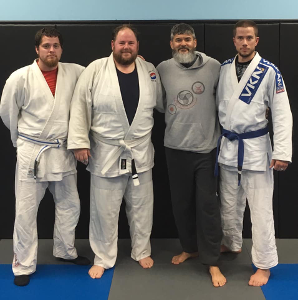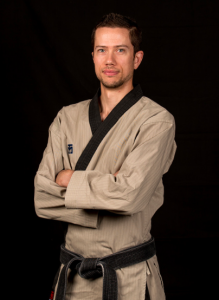 My name is Ian Jensen, and my passion for martial arts began at a young age although my formal training did not begin I was an adult. Since that time, I have achieved a 5th Dan in Taekwondo, 1st Dan in Hapkido, and a Purple Belt in Brazilian Jiu Jitsu. I remain active in both training and in competition which I believe to be an important part of refining skills and continued improvement. I have also earned certifications as a Stick Mobility Instructor, Russian Kettlebell Instructor, Club bell Yoga Instructor, and USCCA Defensive Pistol Instructor. One lesson learned is that it is never too late to begin your self-improvement journey!
My name is Ian Jensen, and my passion for martial arts began at a young age although my formal training did not begin I was an adult. Since that time, I have achieved a 5th Dan in Taekwondo, 1st Dan in Hapkido, and a Purple Belt in Brazilian Jiu Jitsu. I remain active in both training and in competition which I believe to be an important part of refining skills and continued improvement. I have also earned certifications as a Stick Mobility Instructor, Russian Kettlebell Instructor, Club bell Yoga Instructor, and USCCA Defensive Pistol Instructor. One lesson learned is that it is never too late to begin your self-improvement journey!
Many people misunderstand the nature of martial arts. The misconceptions I have encountered range from misunderstanding its practice, its uses, and its benefits. Today I would like to share my vision of martial arts as a transformative process and a commitment to personal excellence as well as personal safety and well-being.
Martial Arts Practice
Martial arts training engages the body as well as the mind and spirit or emotions. In practicing a martial art, one is committed to developing mental clarity and emotional control as well as developing physical skills. It is for this reason that many people practice martial arts for the self-discipline that grows from its practice. The daily dedication to personal growth in martial arts has as its natural byproduct more productivity at work, more focus in academics, and a calmer and more thoughtful personal life.
Martial arts promote confidence and self-reliance both of which result in a sense of true pride in one’s accomplishments. No one else can perform your martial arts for you – your martial arts at any given time are an expression of your own commitments. While those commitments may vary at different times, the overall effect is building strength of body, mind, and character which shine and support you in every aspect of life. To practice, martial arts is not simply to practice kicking, punching, or grappling although each of these skills are an important part of martial competence. It is to practice each day renewing the promise to strive for greater health, fitness, and increased quality of life through challenging one’s own current limitations. Martial arts practice is really life practice and is one of the few endeavors where you can consistently develop physical skills side by side with developing respect, practical judgment, and a sense of community responsibility in a positive environment where each of your classmates and teammates shares that same goal and vision.
Martial Arts Use
Historically, martial arts training was focused on combat. Today, martial arts training still has a strong self-defense component and is often used as a departure point for building greater personal safety and awareness in adults, and as a means of building confidence and protection against bullying in children. Personal safety and awareness are critical life skills and training in martial arts is an excellent way to ensure that one has the basic confidence, physical competence, and situational assessment skills to stay safe and assist in establishing a safe environment for others.
There is also a sport focus to martial arts and an avenue for competition in a safe and sportsmanlike manner. Too often people see images of “fighting” without understanding the training, practice, and group effort behind a successful competitor. Martial arts is a deeply respectful sport in which its practitioners understand and value the important role of a strong opponent in improving one’s own skills.
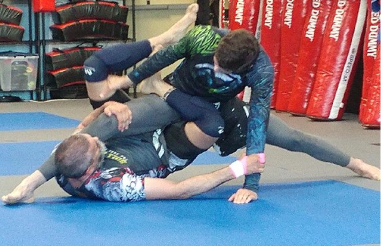
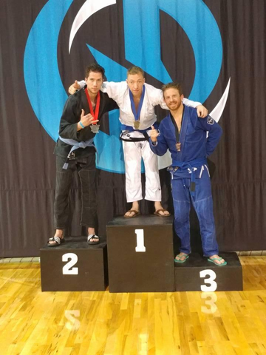 Tournament participation is not required of martial arts students, but for many, it is an important way to practice the execution of skill under pressure in an environment that is still controlled. Through this experience, practitioners learn and grow in ways that they may not have discovered outside of competitive experience. Still, others use martial arts as a form of exercise. It has the benefit of being accessible to people of nearly every age and all ability levels. This makes it an ideal family activity as well as a life-long sport that can be enjoyed and adapted as our bodies change.
Tournament participation is not required of martial arts students, but for many, it is an important way to practice the execution of skill under pressure in an environment that is still controlled. Through this experience, practitioners learn and grow in ways that they may not have discovered outside of competitive experience. Still, others use martial arts as a form of exercise. It has the benefit of being accessible to people of nearly every age and all ability levels. This makes it an ideal family activity as well as a life-long sport that can be enjoyed and adapted as our bodies change.
Some students are drawn primarily to martial arts because of its success in managing difficult emotions whether chronic or due to life transitions. Martial arts is particularly well suited for channeling emotions we as adults don’t find helpful such as stress, anxiety, fear, impatience, or anger into empowering change. Many parents choose martial arts for children in whom they especially desire to cultivate perseverance and the ability to successfully navigate adversity.
Martial Arts Benefits
Many of the benefits of martial arts training have already been discussed, but now that you are more familiar with martial arts practice and its use it may be helpful to summarize them:
- Physical Skills – martial artists need strength, endurance, flexibility, agility, speed, timing, balance, and coordination. These are all skills that progress with martial arts practice and are transferable to other sports and physical activity. Martial arts also improves one’s everyday movement by increasing body awareness and training equally both dominant and non-dominant sides of the body.
- Injury Prevention – because flexibility and balance play such an important role in martial artists, practitioners experience fewer injuries related to tight muscles or loss of balance. Increased flexibility also results in improved posture, less soreness, less muscle tension, and less restriction of movement.
- Overall health – the regular practice of martial arts supports healthy weight loss, lower blood pressure, lower cholesterol, more regulated blood sugar and insulin levels, and lower heart rates. Martial arts is a great way to supplement other forms of regular exercise and add variety to your exercise routine.
- Sport –martial arts is a healthy form of competition that does not have to end after college or high school. Martial artists continue to compete at all ages. It is one of the few competitive sports ones that can begin as an adult and achieve success at not only the local but also national and world levels.
- Skill Augmentation – many athletes in other sports find martial arts to be an excellent supporting activity in which to work on coordination, endurance, speed, agility, timing, and spatial awareness.
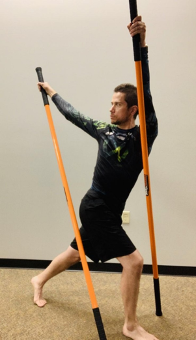
- Self Defense – we don’t like to focus on the negative but it is a reality that people don’t always make safe choices and a solid knowledge of self-defense not only helps you avoid many potential dangerous encounters but gives you an advantage if one does occur. In addition to open hand self-defense, training with improvised weapons means that self-defense is accessible to anyone of any age or level of mobility with the objects that are closest to hand.
- Mental Stamina – martial arts like other aerobic exercises improve memory and learning skills. It also improves focus and establishes patterns of achievement that result in an “I can do this” attitude. Martial arts involves persistence and a robust and resilient attitude towards failure and change. The result is a commitment to continue to work for positive solutions both on and off the training floor.
- Social Skills – Martial arts is an excellent blend of personal achievement in a group or team setting. With a foundation in respectful behavior and basic skills such as the regular expression of courtesy and generosity of spirit martial arts is a great way to make friends and learn leadership and team-building skills
- Goal Setting – Martial arts is structured as a goal-setting activity where we continually put ourselves in a “beginner’s mind” and seek new ways to excel. Whether it is belt progression, improved competitive performance, or personal management issues martial arts centers around continually assessing and exceeding one’s previous personal best.
- Family Time – Martial arts is an excellent family activity. In fact, families that train together or students that train with a dedicated training partner persist through difficulty more readily and make steadier progress towards their goals.
These are just a few of the many benefits of martial arts practice. We always welcome new students who are interesting in learning more about our programs or trying out a class. You can contact me at 262-367-8785 or via www.lakecountrymartialarts.com to discuss how martial arts training might support your current training program, or benefit you or your family. My goal is to assist you in achieving your health and fitness aspirations.
